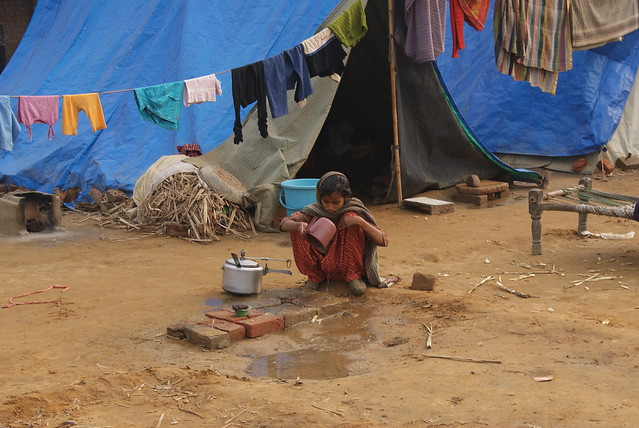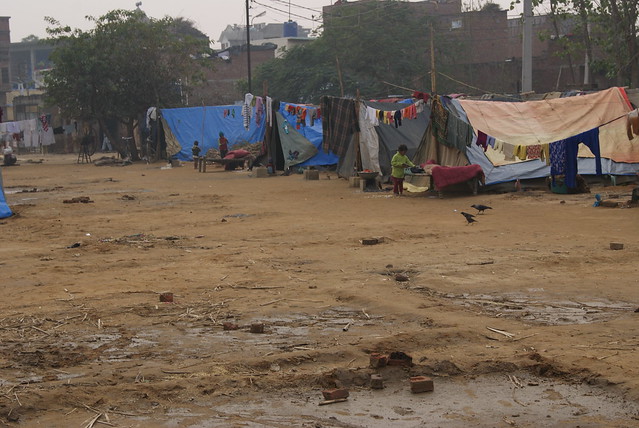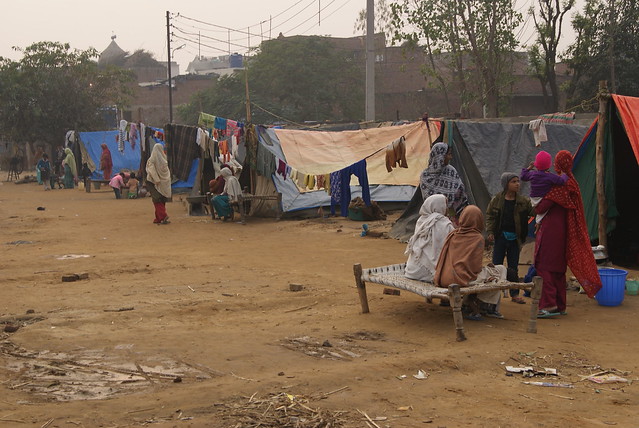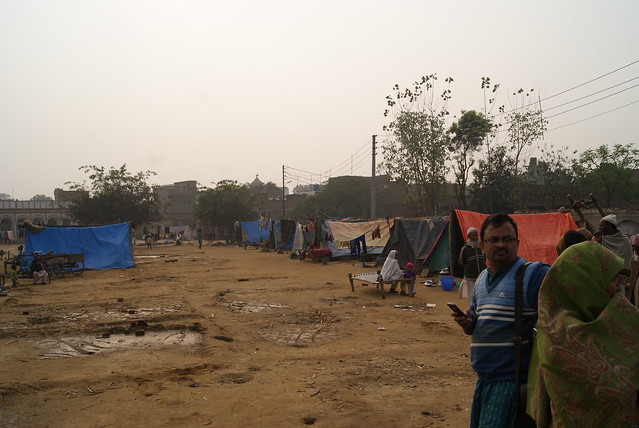By Shruti Nagvanshi,
On December 23 in the afternoon I got a call from Meherunisha, a survivor of communal riots of Muzaffarnagar. She told me they have been forcibly evicted from the relief camp and they have no other place to go. She said, “Where can we go now? For god sake help us, we desperately need your help.” Meherunish was crying inconsolably for help. She was repeatedly saying “where can they go in this chilly winter? She said at present she is outside a house in the village at Gokulpur with her little children and mother-in-law. Many other families like her need help who have no place to stay. Madrasa management all of a sudden removed their tents, they kept on requesting but they did not listen”.
We immediately informed the Chief Minister of Uttar Pradesh, Shri Akhillesh Yadav, National Human Rights Commission and the Central Government through an e mail and registered post and appealed all of them to intervene immediately to help the riot victims.

Our team with four members which included Dr. Lenin Raghuvanshi (Director, People’s Vigilance Committee on Human Rights (PVCHR), Major (Dr.) Himanshu Singh, a renowned social worker of Meerut, Mohammed Taj, a human rights worker and myself, Shruti Nagvanshi, (Convener, Voice of People, Uttar Pradesh) visited the temporary relief shelter camp built in open space for riot victims at Islamia Madrasa in Shahpur village on December 21, 2013. Some of the families from this camp had already left to an unknown destination. There was filth and grime everywhere.
Those staying in the camp were mainly daily wager labourers. On December 23, residents of this camp were forcibly evicted and asked to go back to their homes. This created a problem for them because they had no place to go. They did not want to go to their original village due to fear because they somehow escaped from their village to save their lives. Their houses were already ransacked by the unruly crowd. Survivors told us that they were taken to their villages to do a survey in official vehicles and when they saw the roof tops of their houses were missing, they told the officials that there is nothing left for them so how can they go back and put their lives in danger once again.
One of the survivors in her self-testimony said in a painful voice, “A panchayat held in Mandore on September 7 changed the course of our lives. For generations we had been living in our village. We are daily wage workers, whatever work we used to get, we used to earn our livelihood with that. But during the panchayat there was a fight between Jats and Muslims in which two persons from Jat community were killed. When their bodies were brought to the village, all hell broke out. A group of people from Jat community started driving us out from our houses. We somehow managed to escape and survived. Earlier we were living together in peace but now the same people were out to threaten and kill us. They were very angry; they were carrying arms in their hands. We were unable to understand as to what exactly was happening and why? Everyone was running in whichever direction one could to save themselves and their families. Had we not acted quickly, we would have been killed along with our children. Either our children would have been killed; if not, then we would have become the target. We were destined to suffer in any case”.

In Shahpura Islamia Madrasa camp around 300 affected families were living from different villages such as Sisoli, Hadoli, Kakde, Soram and Goila. At present 82 families were left in the make shift tents who were also driven out of their homes on December 23. Among these families there were five pregnant women who were having a pregnancy period running in between 5 to 7 months. They were as follows: 1-Afsana, age 19, w/o Wajid, 2- Parveen, age 30, w/o Aslam, 3- Shamshida, age 30, w/o Aas Mohammed, 4-Sanjida, age 26, w/o Mehboob, 5- Momina, age 30, w/o Dilshad.
Shahjana of Kankre village, age 30, w/o Kamil works as a daily wage labourer in brick making factory. When she came to the camp after saving her life and her family from her village, she gave birth to a girl child. She was helped by her mother-in-law during the delivery period. After eighth day of the birth the child became sick and suffered from pneumonia. They tried to get her treated but finally the girl could not survive and died. Shabana, age 30,w/o Nafis gave birth to a girl child after two months in the camp, the girl also died after one week due to pneumonia. Parveen, age 30, w/o Aslam said,“ We are living in the camp with great pain and guilt. When we go out to nearby shops to buy essential items, people often make remarks at us mockingly that we are greedy freeloaders and we are living in camp for the sake of relief materials like blankets. We just ignore their comments. In this shelter we pray to God for not letting anyone in such a situation. During the nights puppies come and sleep at our temporary kitchen and next morning we use the same kitchen to cook our food. It hurts our religious sentiments but god is witness and he will forgive us”.
Mehrunisha of Hadauli village told us, “My husband Sattar was missing during the riots. I and my 70 years old mother-in-law remained disturbed and extremely worried about his safety. After seven days we found him in Khatauli. After listening to his story we were in a state of shock. In the evening when my husband was returning after selling clothes, he was chased by three people from Jat community riding on motorbike. He ran to save his life. But near a clinic they caught hold of my husband. While they were about to attack him with a sharp edged weapon, they were stopped by the doctor. When the doctor asked them the reasons to kill my husband, they replied that they just want to kill him for no reason. Due to the intervention of the doctor, my husband could flee the scene to save his life. The doctor belonged to the Jat community and due to him my husband’s life was saved. Had he not been there at the spot, my husband would have definitely been killed. We are thankful to him for showing his courage to retrain those who wanted to kill my husband. My husband fell ill due to the fear. I sold my gold jewelleries to get his medical treatment. He is still in a state of shock. He falls sick because of that experience. My sister has given him shelter and care. I am in the relief camp along with my children and mother-in-law. After all, we do not want to put the burden on our relatives.”

Chhoti of Sisoli village, age 28, w/o Idrish gave birth to a girl child, Aaksha in the relief camp. During the riots her brother Yasin was also present in Sisoli village. He was injured when he was attacked by a sword for which he was treated in Shahpur. Due to lack of proper medical facilities he has gone back to his home but he has not received any compensation so far. Khaton, age 35, w/o Noorhasan, has a two and half year old child. Besides her there are so many families with little children who never received any care and medical treatment here in the camp. We also came across an extremely disturbing fact that is, people belonging to at least 15 families from Soram, Sisoli, Hadauli and Gorla villages living in Shahpur relief camps were not considered as riot affected families by the administration. Sisoli and Soram are better known for their khap panchayats. Sisoli is also the village of a popular Jat Kisan leader. The women told us that in Soram they were stripped naked, bullets were fired on them, acid was also thrown but somehow they managed to flee and saved their lives. They were also beaten by the police. Just a day before in Soram, Muslim children returning from school were badly beaten. Masjid in Hadauli was burnt down. Saleha, the daughter of Hakimu of Dulhera is still missing.
We found that the soil in the camp was wet due to rain water and many places were water-logged. In many tents grass layers were also completely wet. Women and children took us to their tents to narrate their plight. They told us they do not sleep during the wintry night because it is too cold. Children are falling sick due to exposure to cold and others infections. With temperatures plummeting children, old people and pregnant woman are especially at risk. After the riots doctors came to visit on one or two occasions but after that nobody came. Whatever clothing they had on their bodies, they sold them to arrange their medical treatment. Even now many infant children, their mothers and many pregnant women are forced to live in open areas in bone chilling cold while battling with poor conditions.
European Union has announced a financial package of one lakh and fifty thousand Eruos to help the survivors of communal riots of Muzaffarnagar and Shamli through OXFAM. Organisation like Child Rights and You (CRY) has also decided to extend direct assistance while taking into consideration the news of deaths of many children in the area.

Around nine thousand eight hundred and four (9804) children were estimated to be residing in the relief camps established in Muzaffarnagar and Shamli. Among them many children have died due to unpleasant conditions. Still there are many children and pregnant women left in the camps who are facing difficult times due to the lack of medical facilities and adequate care. They are the people who need the utmost care and help. Last year during the month of December,2012 the whole country witnessed a series of protest and condemnation in Nirbhaya rape[v] case but a deafening silence on the part of the civilized civil society groups on the reported 13 incidents of rape and molestation of riot affected women of Muzaffarnagar till 5 November, 2013 puts a question mark on their role in society.
The incidents of molestation and mindless killings during the communal violence of Muzaffarnagar and consequent blocking of the news clearly speak of a nexus among the Hindu fascist force, communal section of media in local, administration and communal forces from Muslim community. It clearly confirms the remarks made by the renowned Anglo-Irish political thinker and philosopher, Edmond Burke on India, “In that Country the law of religion, the laws of the land, and the law of honour, are all united and consolidated in one, and bind a man eternally to the rule of what is called his caste.”
At present the riot affected people living in the camps are facing forcible eviction ordered by the administration. Their homes had already been ravaged. They have no ancestral property in their original villages. They are not even having the basic amenities available to citizens like ration card, MANREGA Job card etc. These families are forced to live as displaced persons. Therefore, it is crucial at this stage to identify those families who have been uprooted and displaced due to the communal riots and programmes should be initiated to provide them food security, housing, primary health care facilities for women and children and education facilities.

Community of psychologists would agree with the fact that these families require long term medical care because human mind is adversely affected by the violent incidents. The psychological trauma on the people is probably irreversible. The situation also gives rise to various physical and mental disorders which in turn also affects their work abilities, decision making and self-confidence. Low temperatures during the winter season also cause serious troubles for children and pregnant women who need special care and protection.
It appears that in the ongoing blame game and fights between various political parties, the riot victims have become mere pawns caught in a political game. Under these circumstances all political parties should jointly work together to help the riot affected people and should not indulge in misleading the general public. There is also the need to immediately launch rehabilitation programmes to protect the civil rights of the survivors without any discrimination and restore their self-dignity. Emphasis should also be given to their psychological and social restoration. As a reconciliatory measure, riot affected gram panchayats should apologise the survivors for their troubles and should work to rehabilitate them in their respective villages. If they fail to do that, the administration should immediately withdraw development funds earmarked for these gram panchayats.”
—
Shruti Nagvanshi is Convener of Voice of People, Uttar Pradesh)

